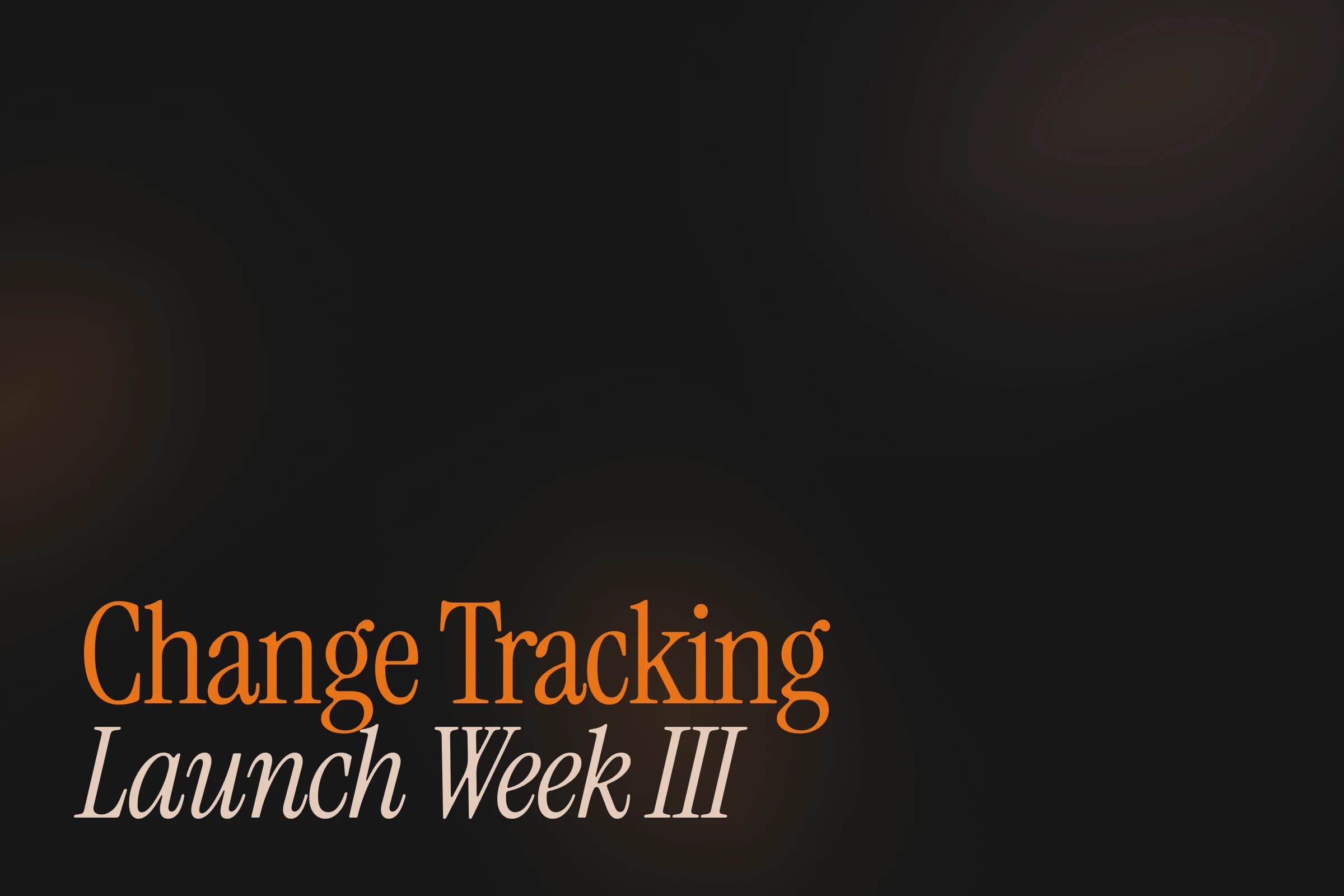
Welcome to Launch Week III, Day 1! Today we're excited to announce Change Tracking — an enhanced Firecrawl feature that automatically detects and details changes on websites, now available in beta for all users.
What is Change Tracking?
![]()
Change Tracking allows you to monitor website changes by comparing the current scrapes and crawls to previous versions, clearly indicating if content is new, unchanged, modified, or removed.
Each Change Tracking response includes:
| Field | Description |
|---|---|
previousScrapeAt | Timestamp of the last scrape (or null if no previous scrape) |
changeStatus | new, same, changed, or removed |
visibility | visible (found through crawling) or hidden (found via memory) |
diff (optional) | Git-style diff of changes (when enabled) |
json (optional) | Structured JSON comparison of specific fields (when enabled) |
Simple Integration
Firecrawl's Change Tracking feature integrates effortlessly into your existing workflows with two simple request methods—scrape and crawl. You must specify the markdown format in addition to changeTracking:
Scrape Request Example:
const scrapeResponse = await app.scrapeUrl("https://firecrawl.dev", {
formats: ["markdown", "changeTracking"],
});
console.log(scrapeResponse);Scrape Response:
{
"url": "https://firecrawl.dev",
"markdown": "# AI Agents for great customer experiences\n\nChatbots that delight your users...",
"changeTracking": {
"previousScrapeAt": "2025-04-10T12:00:00Z",
"changeStatus": "changed",
"visibility": "visible"
}
}Crawl Request Example:
const crawlResponse = await app.crawlUrl("https://firecrawl.dev", {
scrapeOptions: { formats: ["markdown", "changeTracking"] },
});
console.log(crawlResponse);Crawl Response:
{
"success": true,
"status": "completed",
"completed": 2,
"total": 2,
"creditsUsed": 2,
"expiresAt": "2025-04-14T18:44:13.000Z",
"data": [
{
"markdown": "# Turn websites into LLM-ready data\n\nPower your AI apps with web data from any website...",
"metadata": {},
"changeTracking": {
"previousScrapeAt": "2025-04-10T12:00:00Z",
"changeStatus": "changed",
"visibility": "visible"
}
},
{
"markdown": "## Flexible Pricing\n\nStart for free, then scale as you grow...",
"metadata": {},
"changeTracking": {
"previousScrapeAt": "2025-04-10T12:00:00Z",
"changeStatus": "changed",
"visibility": "visible"
}
}
]
}Advanced Change Tracking Modes
Change Tracking supports multiple advanced modes to suit different monitoring needs:
- Git-Diff Mode: Provides detailed, Git-style line-by-line diffs, perfect for content updates and edits.
- JSON Mode: Offers structured comparisons using a custom schema to track specific data changes, ideal for monitoring product details, pricing, or key text changes.
Advanced Change Tracking Request Example:
const result = await app.scrapeUrl("http://www.whattimeisit.com", {
formats: ["markdown", "changeTracking"],
changeTrackingOptions: {
modes: ["git-diff", "json"], // Enable specific change tracking modes
schema: {
type: "object",
properties: {
time: { type: "string" },
},
}, // Schema for structured JSON comparison
prompt: "Get the time", // Optional custom prompt
},
});
// Access git-diff format changes
if (result.changeTracking.diff) {
console.log(result.changeTracking.diff.text); // Git-style diff text
console.log(result.changeTracking.diff.json); // Structured diff data
}
// Access JSON comparison changes
if (result.changeTracking.json) {
console.log(result.changeTracking.json); // Previous and current values
}Git-Diff Results Example:
**April, 13 2025**
-**05:55:05 PM**
+**05:58:57 PM**
...
JSON Comparison Results Example:
{
"time": {
"previous": "2025-04-13T17:54:32Z",
"current": "2025-04-13T17:55:05Z"
}
}How Change Tracking Works
When enabled, Firecrawl compares current scrapes against previous versions based on URL, team ID, and markdown format:
- Comparison is resilient to whitespace and content order changes.
- Iframe source URLs are ignored to avoid false positives caused by captchas or antibots.
Important Considerations and Limitations
- URL Consistency: Ensure URLs match exactly for accurate comparisons.
- Scrape Option Consistency: Variations in scrape options can affect consistency.
- Team Scoping: Tracking is scoped per team; initial scrapes always show as
new. - Beta Monitoring: Watch the
warningfield and handle missingchangeTrackingobjects due to potential database timeouts.
Pricing
- Basic tracking and Git-diff mode: Free
- JSON mode: 5 credits per page scrape due to additional processing requirements.
Get Started Today
Change Tracking is live in beta for all users:
- Try it now: Add
changeTrackingto your scrape or crawl formats. - Learn more: Read the docs for
/scrapeand the docs for/crawl. - Get help: Join our Discord community or contact help@firecrawl.com.
Ready to track detailed content changes? Sign up for Firecrawl and start today.

data from the web